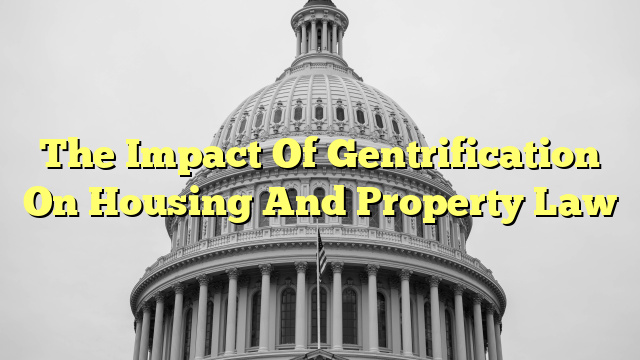Table of Contents
- How Does Gentrification Impact Housing?
- How Does Gentrification Affect Property Values?
- How Does Gentrification Affect Housing Economy?
- What Are the Impacts of Gentrification?
How Does Gentrification Impact Housing?
Gentrification is the process of renovating and improving a house or district so that it conforms to middle-class taste. This can include remodeling interiors and exteriors, improving landscaping, and increasing property values. As a result, gentrification can have a significant impact on housing.
The most direct impact of gentrification is an increase in housing costs in the area being gentrified. As property values increase, so do rent and purchase prices for homes. This can make it difficult for lower-income individuals and families to remain in the area or even find housing in the area.
The impact of gentrification on housing is also felt in terms of the types of housing available. As the process of gentrification progresses, the types of housing available may change. Low-income housing may be replaced with more expensive housing, making it difficult for lower-income individuals and families to find affordable housing in the area.
Finally, gentrification can also have an impact on the physical structure of housing in the area. As gentrification progresses, existing buildings may be remodeled or demolished to make way for new developments. This can lead to changes in the architectural style of the area, as well as the loss of historic buildings and structures.
How Does Gentrification Affect Property Values?
Gentrification can have a significant impact on property values. As gentrification progresses, property values tend to rise due to the increased demand for housing in the area. This increased demand can drive up prices for homes, making them more expensive for lower-income individuals and families.
In addition, gentrification can lead to changes in the types of housing available in the area. This can lead to an increase in the number of higher-end homes in the area, which can further drive up property values. The result is an overall increase in property values, which can make it difficult for lower-income individuals and families to purchase or rent in the area.
How Does Gentrification Affect Housing Economy?
Gentrification can also have an impact on the housing economy. As gentrification progresses, the types of businesses and services available in the area may change. This can lead to an overall increase in the cost of living in the area, as the cost of goods and services increases.
In addition, gentrification can lead to an increase in the number of high-income individuals and families in the area. This can lead to an increase in demand for housing, as well as an increase in housing prices. This can further drive up the cost of living in the area and make it more difficult for lower-income individuals and families to remain in the area or purchase or rent housing.
What Are the Impacts of Gentrification?
The impacts of gentrification can be both positive and negative. On the positive side, gentrification can lead to increased property values and an increase in the availability of higher-end housing in the area. This can lead to an overall improvement in the quality of life in the area, as well as an increase in economic development.
On the negative side, gentrification can lead to an increase in housing prices and difficulty finding affordable housing in the area. This can lead to displacement of lower-income individuals and families, as well as the loss of historic buildings and structures.
Overall, the impacts of gentrification depend on the specific circumstances of the area being gentrified. In some cases, gentrification can lead to an overall improvement in the quality of life in the area, while in other cases it can lead to displacement and difficulties in finding affordable housing.


While gentrification may bring new opportunities to previously disadvantaged neighborhoods, I can’t help but consider the negative impacts it has on housing and property law. For example, rental costs are often pushed up, forcing poorer residents to relocate and making it difficult for some to purchase their own property. Such instances raise important questions around fairness and justice.
Interesting article, however I do not agree with the notion that gentrification has a positive effect on property law. Gentrification typically involves displacement which is detrimental to vulnerable populations and cannot be seen as a benefit.